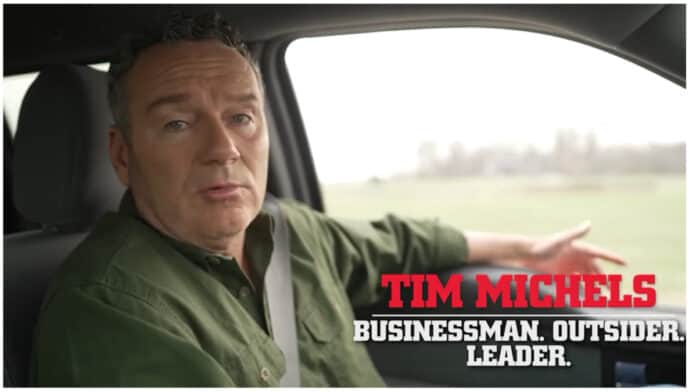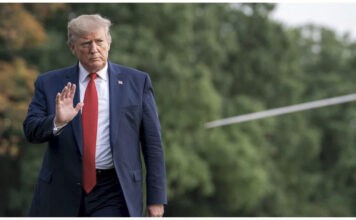Businessman Tim Michels won the Republican primary for governor on Aug. 9, and he won it comfortably.
This was no easy feat; he defeated a well-financed former lieutenant governor for the state’s last Republican governor, a man still beloved with GOP primary voters and who cut advertisements for her besides.
Michels hadn’t been on the political stage since the Russ Feingold race in 2004. He didn’t enter the race until April. So how did he do it?
Here are 11 reasons Tim Michels won the Republican primary, in no particular order:
1. ‘Outsider’ Message
From the get go, Michels crafted a message that echoed Trump’s: Outsider businessman not beholden to special interest money.
That was the message another military veteran, Kevin Nicholson, was pushing until Michels jumped in. We lost track of how many people we spoke to said they were voting for Michels because “he was an outsider.” The message broke through. (Another reason Michels won is because Nicholson dropped out. If he hadn’t, they might have split the veteran-outsider-businessman vote. Tim Ramthun never really took off.)
In a Republican primary, people like it. They like it a lot.
Kleefisch argued that she wasn’t establishment but was harmed by endorsements from controversial figures like Mike Pence and Robin Vos. Whether either Michels or Kleefisch is an outsider is immaterial for the purpose of this post; the point is that this is the message Michels crafted, it broke through, and people liked it.
2. Money
Michels helps run a very successful construction company with his brothers, so he was able to pour millions of dollars of his own money into the race – more than $10 million.
That means he was able to get that outsider narrative to a lot of voters. When we would ask people who said, “I like him because he’s an outsider” why they felt that way, they invariably mentioned his advertisements.
Outside groups spent more (Club for Growth spent $1.8 million). Kleefisch raised a lot of money – historical totals even – and outside groups came in big for her too, but it wasn’t enough.
Michels had the money to magnify his message.
The ability to self-fund, though, doesn’t guarantee victory. Other self-funders have been losing Republican primaries around the country.
3. The Trump Effect
There’s no question that Donald Trump can still play kingmaker in Republican primaries, and it’s a big deal to have the former Leader of the Free World land in the heart of your opponent’s base to verbally nuke her (and her husband).
Whether the president’s attacks on the Kleefisches were fair isn’t the point; the point is that Trump moves votes on the right. Never is that more true than when he goes hard negative.
Perhaps it wasn’t lost on people that Scott Walker was often rather tepid on Trump. He ran against him in the 2016 presidential primary, after all.
As of Aug. 3, before the Michels’ victory, NBC reported, “188 candidates backed by the former president have won primaries, 14 have lost and two dropped out or were disqualified before Election Day.” Some have questioned whether Trump’s primary picks are the best general election candidates in some states (Dr. Oz, for example), but that’s another story.
In GOP primaries, he’s a kingmaker. And he went ALL IN for Michels.
Trump was the closer.
But why? You can, in part, thank billionaire Diane Hendricks for that. The fact that Hendricks ended up in Michels’ camp also opened a lot of doors for him (Reince Priebus too).
4. Michels cut into Kleefisch’s margins in the “WOW” counties
Yes, Michels cobbled together rural voters all over the state and did well in portions of the Valley (like Trump.) But Michels can thank his victory in part to his strong performance in the WOW counties. These are the populous counties of Waukesha, Ozaukee, and Washington counties that helped ensure Scott Walker’s victories.
The Walker political calculus (GOTV in the WOW) appears to have changed. Kleefisch won Waukesha and Ozaukee but still lost the state. She even won Brown County but still lost the state!
However, that’s in part because Michels won Washington County, which is closer to his company’s headquarters. And it’s also because the WOW counties aren’t monolithic. Some areas of the WOW counties are more rural and others are more suburban (think Kewaskum vs. Elm Grove.) Michels did well in the more rural areas of the WOW counties, which helped him hold his own in them, reducing Kleefisch’s margins so she couldn’t offset what he was doing elsewhere in the state.
This article has an interesting breakdown of the WOW counties’ rural/suburban divide. “Within each county, Republicans in the larger municipalities tend to vote for establishment politicians, while voters in the more rural towns often swing toward their challengers. At the county level, Washington County usually offers the weakest support to establishment Republicans, as its population is the least suburbanized of the three,” it says. And that’s exactly what helped Michels.
It’s important to remember that Michels and his wife own a home in Waukesha County. Michels Corp. is located further north, but they’ve been a presence in the WOW counties.
Michels also did well in the southern suburbs of Milwaukee County, where, ironically perhaps, Scott Walker once flipped a lot of historically Democratic union type voters into his camp as a county executive candidate railing against an out-of-control pension scheme. It’s the blue collar voter who liked Trump – and Walker, once. One voter told us he had a lot of union friends who voted for Michels, who runs a union shop. It’s the Reagan Democrat type of voter that he’s targeting now in the general.
5. The Raid
We heard from voters who said the FBI’s raid of Trump’s personal home the day before the election made them switch their votes from Kleefisch to Michels.
It also may have motivated some Trump voters to go to the polls. It’s impossible to know for sure how much this mattered, but we did hear it was happening.
There’s additional evidence for this. The Trafalgar pollster asked voters, “Does the FBI raid on President Trump increase your motivation to vote in the 2022 election?” More than 70 percent said yes.
6. Negative Ads Work
Michels and outside groups supporting him went hard negative on Kleefisch in the final weeks.
We’re not assessing here whether it was true or unsavory; we are just saying it works (although Kleefisch is not a Chinese Communist sympathizer, and her husband actually lobbies for conservative causes.)
Voters were hit with a deluge of direct mail and negative ads. Kleefisch was the first to directly run negative ads in the race, of course.
7. Michels’ Company Is a Big Deal
Michels Corp. is no little company. It’s a big deal – one of the state’s largest employers.
It’s got a well-known presence in some areas of the state.
People have heard of it in some areas of the state, breeding familiarity with the candidate. Or they know somebody who works there.
8. The Red Truck
A guy involved in staging Trump’s rally helped stage Michels’ and you could tell from the start.
The red imagery stood out. The red truck is becoming such a known thing that Tony Evers even ran an ad showing him (ridiculously) driving around in a red pickup truck. If it wasn’t memorable, Evers wouldn’t be trying to co-opt it.
The announcement rally with Michels flanked by construction workers in front of a red truck was masterful imagery. These are Trump’s “forgotten men.”
9. The Past vs. the Future
Voters often don’t want to look back to the past. They want to look to the future. Just ask Hillary Clinton. Joe Biden was an exception, but look how that worked out?
The candidates who win often craft positive messages about crafting a better future (“Make America Great Again” and even “Hope and Change.”)
Although Michels did not have such a memorable tagline (he’s trying to craft one around being a builder or fixing things), he was running against the second-in-command for a very divisive governor. Walker ticked off a lot of special interest groups with various decisions (or inaction) as governor. It was sort of an exhausting time.
Did people want to return to that? Were they worried it would be tougher to win?
Michels ran for office, but that was 18 years ago and most people don’t remember it or barely remember it. So he seemed like a fresher, newer face, not a return to the divisive battles of the past.
10. Kleefisch’s Weaknesses
We’re not in the mood to bash a good woman who has worked hard for conservative causes for years, but we wouldn’t be honest if we didn’t admit that she had some weaknesses. She also had a lot of strengths, including a tenacious grit.
But some voters didn’t like her television reporter’s polished persona. We heard this from a lot of people, especially women.
Kleefisch had a strong campaign team. They made few unforced errors and few strategic mistakes, if any.
Michels had his own weaknesses, of course, but we’re not going to get into them here because it’s not the point of the post. Of course, Tony Evers has even more weaknesses, but, again, that’s not the point of the post.
We’ve heard from some women who are upset because they believe Kleefisch’s gender cost her. We wouldn’t go that far, but it’s something we heard.
The bottom line, though, is that she wasn’t a candidate without flaws.
11. Milwaukee talkers mostly stayed neutral & the state party did too
Milwaukee’s conservative talkers mostly stayed neutral (unlike their counterparts in Wausau and Green Bay, who were anti-Michels. Take a look at how well Kleefisch did in those areas…)
Mark Belling, in particular, can make-or-break a candidate down south.
But he and other hosts stayed neutral (with the lone exception of Jay Weber, who was pro Michels).
Michels was not an unknown figure to the hosts. Belling remembers the Senate race.
Michels was supported by some powerful people, such as Reince Priebus.
If the talkers had been, say, all in for Kleefisch, it might have been a different story. But they weren’t. We’ve heard from readers who liked that they stayed neutral, and they asked tough questions that informed listeners, so it’s not a knock. We’re just saying that it matters. It is worth pondering how the pro-Walker turned Never Trumper Charlie Sykes might have altered this race if he was still on the air. Charlie helped build Walker through the pension revolt recall, and he used to carry a big stick. Instead, Sykes whipped out a column trashing Michels after the race. But that’s geared for an elite beltway Never Trumper audience, not the folks back home, who don’t listen to him anymore.
As for the state party, Kleefisch got the most votes but not the endorsement because of a bizarre state party approach to include no endorsement as a “candidate” choice. That was due to efforts by Kevin Nicholson, who didn’t support either candidate but who pushed for non endorsement. Although we don’t think the party endorsement would have won it for Kleefisch (she already had the grassroots contacts and it doesn’t come with much money really), it would have given her a PR boost. It might have contributed to the establishment tag though, so it would have been a mixed bag. Still, it all added up.
Table of Contents

















